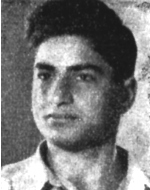Cohen, Nissim
The eldest son of Leah-Maniulah and Menahem. He was born on October 9, 1947 in Bulgaria. Brother to Sammy. Nissim’s arrival to the world surprised his parents with a miracle because they were born only after five years of marriage. A year later his family immigrated to Israel and settled in Jaffa. Nissim attended elementary school in his hometown, and then went to work to help support the family. In 1965, Nissim enlisted in the Border Police as a policeman, because he wanted to continue the legacy of his uncle, who was also a Border Police officer. After a period of basic training and training, he was stationed as a combat soldier in Company Z, and served in the Jordan Valley. Among the company’s officers he was known as a trustworthy and trustworthy soldier, and he always did his job thoroughly and professionally. Nissim was very attached to his family, and whenever he went on holiday, he helped his parents as much as possible. On Saturday, October 8, 1966, Nissim Cohen was supposed to go out to his home and celebrate his birthday with the family, but he gave up going home when he volunteered to replace another soldier who had fallen ill. Says his cousin Regina Tahor Varsano, that Shabbat Nissim was about to ask for his girlfriend’s hand. For about a year and a half until the middle of 1966, incidents on the Syrian-Israeli border took place, which were called the “war on water” and eventually led to the outbreak of the Six-Day War. The Syrians tried to divert the sources of the Jordan River and cause severe damage to the Israeli water economy, and as a response, Syrian tanks and planes attacked the Syrian tractors, and the Ba’athist radical faction seized control of Syria and continued its aggressive line against Israel. And in October 1966, with the support of the Soviet Union, the Syrian leaders issued an official call for a general mobilization for the army and for a popular war in Israel. In October-November, terrorists infiltrated from Jordan into Israel. On the night of 24 Tishrei 5727 (8-9.10.1966) three loud explosions were heard from the direction of Wadi al-Hama, until suns were smashed at Kibbutz Shaar Hagolan in the Jordan Valley, and about a kilometer from the kibbutz and a Border Police force The soldiers of the force checked one of the pumping machines of Kibbutz Sha’ar Hagolan and proceeded to the tool store, which lies about 300 meters north-east of the kibbutz. That a terrorist cell sabotaged the site and blew up the warehouse and a trailer laden with crates of grapefruit. Around the warehouse that was completely destroyed were the tools. The soldiers continued on a dirt road in the fields of Sha’ar Hagolan, towards the Second Water Institute. At 23:30, the jeep mounted a powerful mine, crashed and killed four residents, including Nissim Cohen. His friends who were killed were: Sergeant Yosef Amar, policeman Yaakov Gigi and policeman Avraham Levy. Two other soldiers were killed in the same incident. The dirt road in which the mine was laid was used by the kibbutz members and led to the groves along the border. The site is located outside the demilitarized zone, c. 1 km west of the Jordan border and c. 1 km north of the Syrian border. Following the harsh incident, Israel filed a harsh complaint with the Israeli-Syrian Armistice Commission. Police officer Nissim Cohen fell in combat at the age of nineteen. He was laid to rest at the military cemetery in Kiryat Shaul in Tel Aviv. Levi Eshkol, the then prime minister, came to Sheva to personally comfort the family. His cousin Regina says that Nissim was a particularly beloved young man, with rare kindness, who always took care of others and never asked for anything for himself. He did not win a home in Israel, and his parents carried their heavy grief until the last moments of their lives. For thirty years they could not accept his death, talked about it, and mentioned it as part of their daily routine
